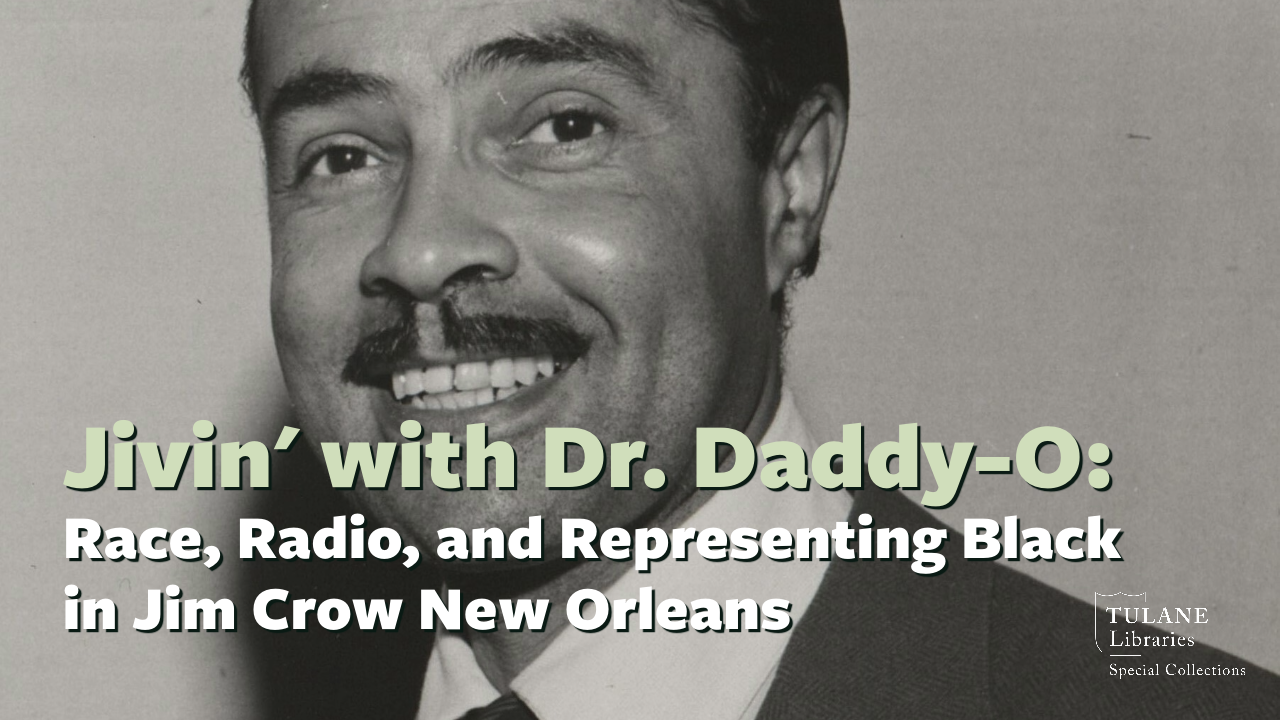Video: "Jivin' with Dr. Daddy-O: Race, Radio and Representing Black in Jim Crow New Orleans"
The video for “Jivin' with Dr. Daddy-O: Race, Radio and Representing Black in Jim Crow New Orleans" is now available to view at this link, via the Tulane University Libraries YouTube page.
The online presentation was given on October 2, 2023, during American Archives Month, and by Melissa A. Weber, curator of the Hogan Archive of New Orleans Music and New Orleans Jazz, a unit of Tulane University Special Collections.
About the presentation:
Both because of and in spite of Jim Crow laws, which enacted segregative policies, a Dillard University art professor named Vernon Winslow transformed himself in 1949 into Dr. Daddy-O, the first Black disc jockey to host his own program on New Orleans radio. His pioneering show as a broadcaster extended beyond integrating the airwaves. He began his radio career by creating the character of and writing scripts for Poppa Stoppa, a white WJMR AM DJ who became popular by using Black dialect and slang, as coached by Winslow off-air, since African American on-air talent was not yet allowed. With his first show as Dr. Daddy-O, Winslow broke down segregated airwaves in New Orleans and, in the process, integrated his previous skills in advertising and public relations, his new skills as a broadcaster, his natural ability to communicate, and his early understanding of the power of attracting Black audiences, promoting Black music, and embracing Black vernacular on air. His story adds to the narrative of Black radio history, the birth of rock ‘n roll, the desegregation of New Orleans airwaves, and the role of sales and advertising in radio broadcasting.
In 2019, the GRAMMY Museum Grant Program awarded a Preservation Implementation Grant to Tulane University Special Collections to conserve and digitize rare recordings from the Vernon Winslow Collection of Phonograph Records, housed with the Hogan Archive of New Orleans Music and New Orleans Jazz. The unique recordings on 78 RPM discs include Dr. Daddy-O’s remote broadcasts, his interviews with leading jazz, blues, and rhythm & blues icons of the 1950s, and Winslow’s own trademark vocal style as a legendary radio personality and cultural influencer. These recordings will be incorporated into a discussion on Winslow’s groundbreaking contributions to broadcasting, and how they can inform interdisciplinary approaches to radio preservation and history.
Weber previously shared the presentation at the Library of Congress' Radio Preservation Task Force 2023 conference, which highlighted how preservation contributes to the history and creation of mass media at community, local, national, and international levels.
For more information, contact Melissa A. Weber at mweber3@tulane.edu or 504-247-1807. To learn more about Tulane University Special Collections, visit the TUSC website at library.tulane.edu/tusc, email specialcollections@tulane.edu, and follow them on Facebook and Instagram.
Published October 6, 2023
Photo caption: Vernon Winslow, JAX advertising representative, at the JAX Millionth Barrel Seafood Buffet (photo detail), circa 1954, Jackson Brewing Company Records, LaRC-265.
